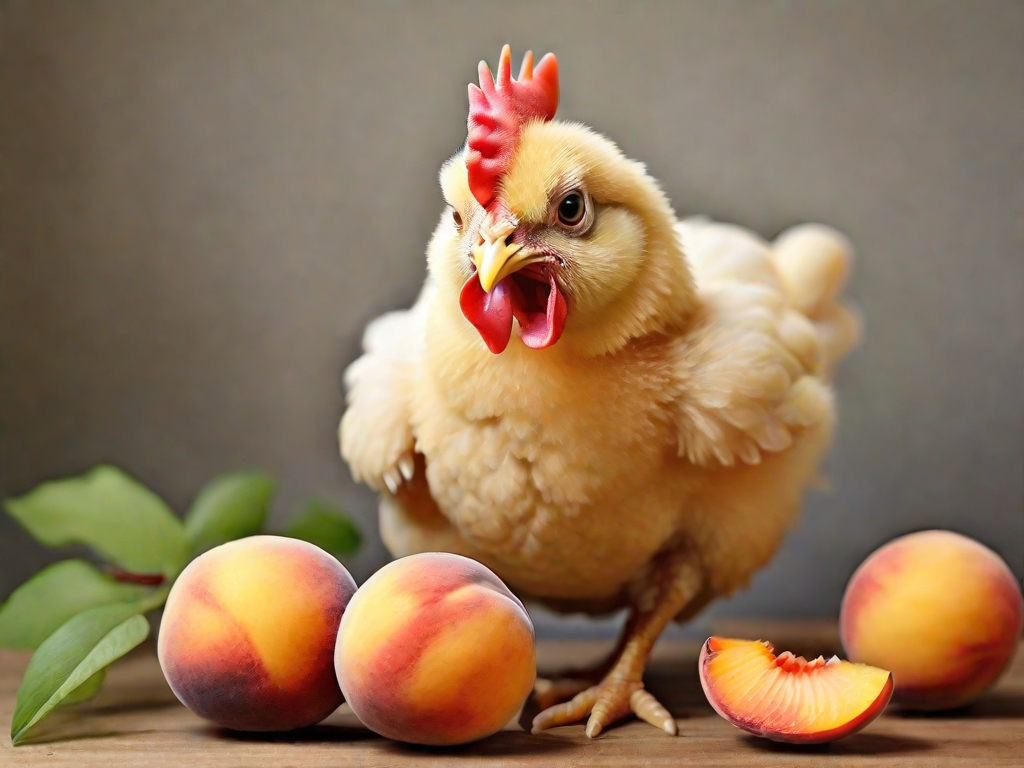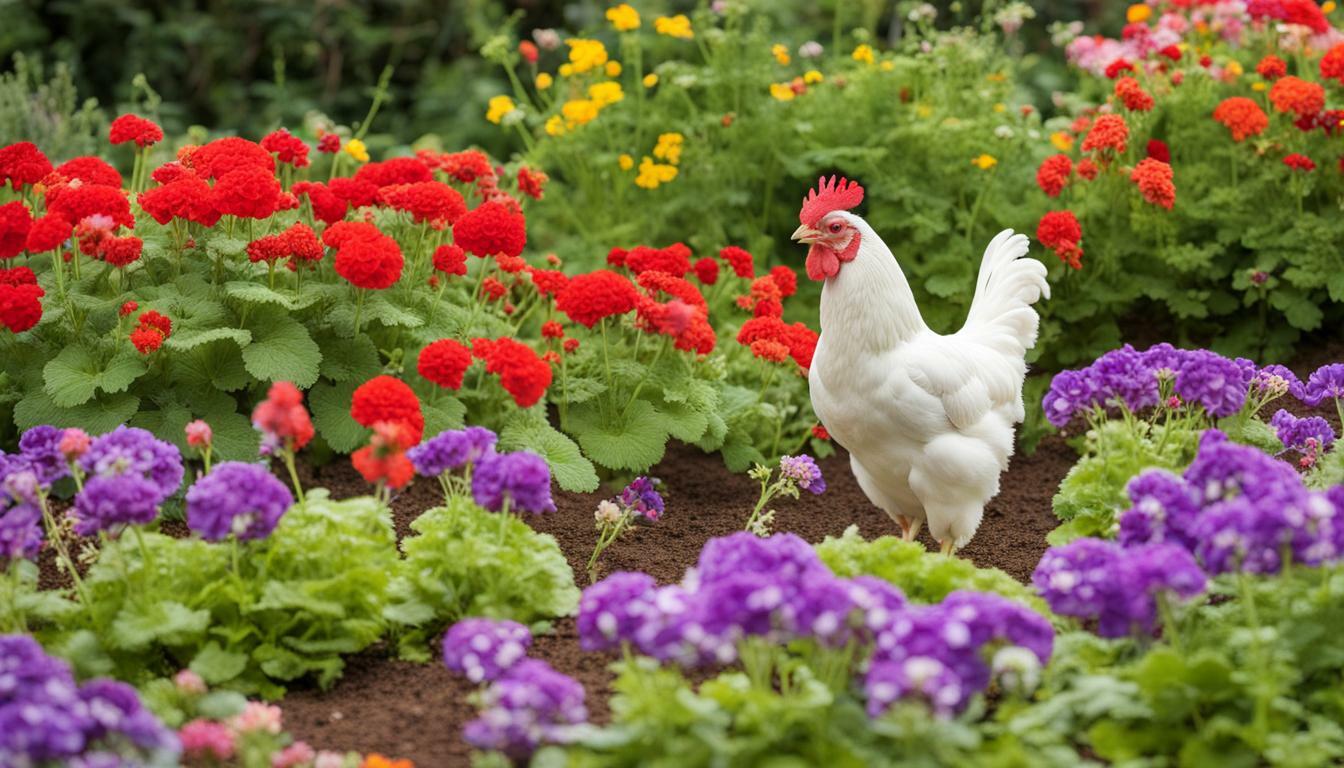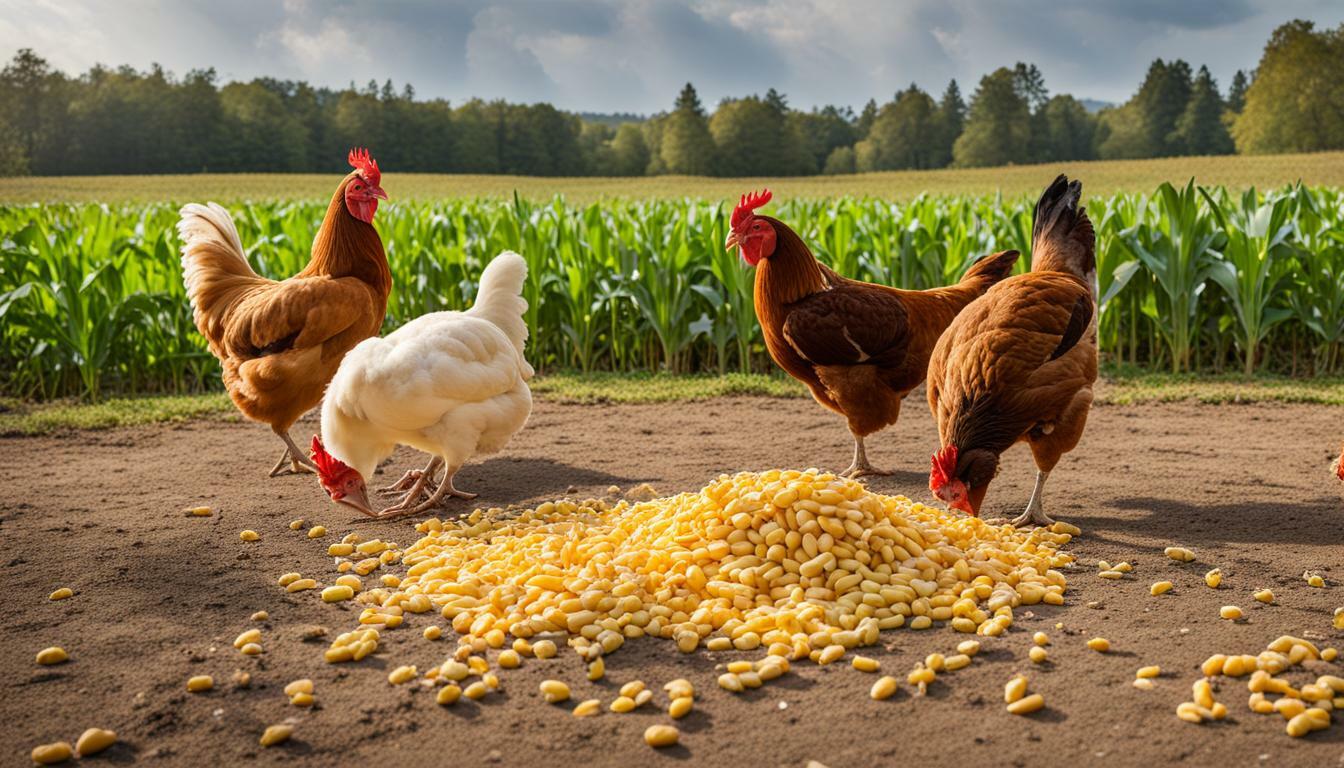Can Chickens Eat Peas? Benefits and Risks
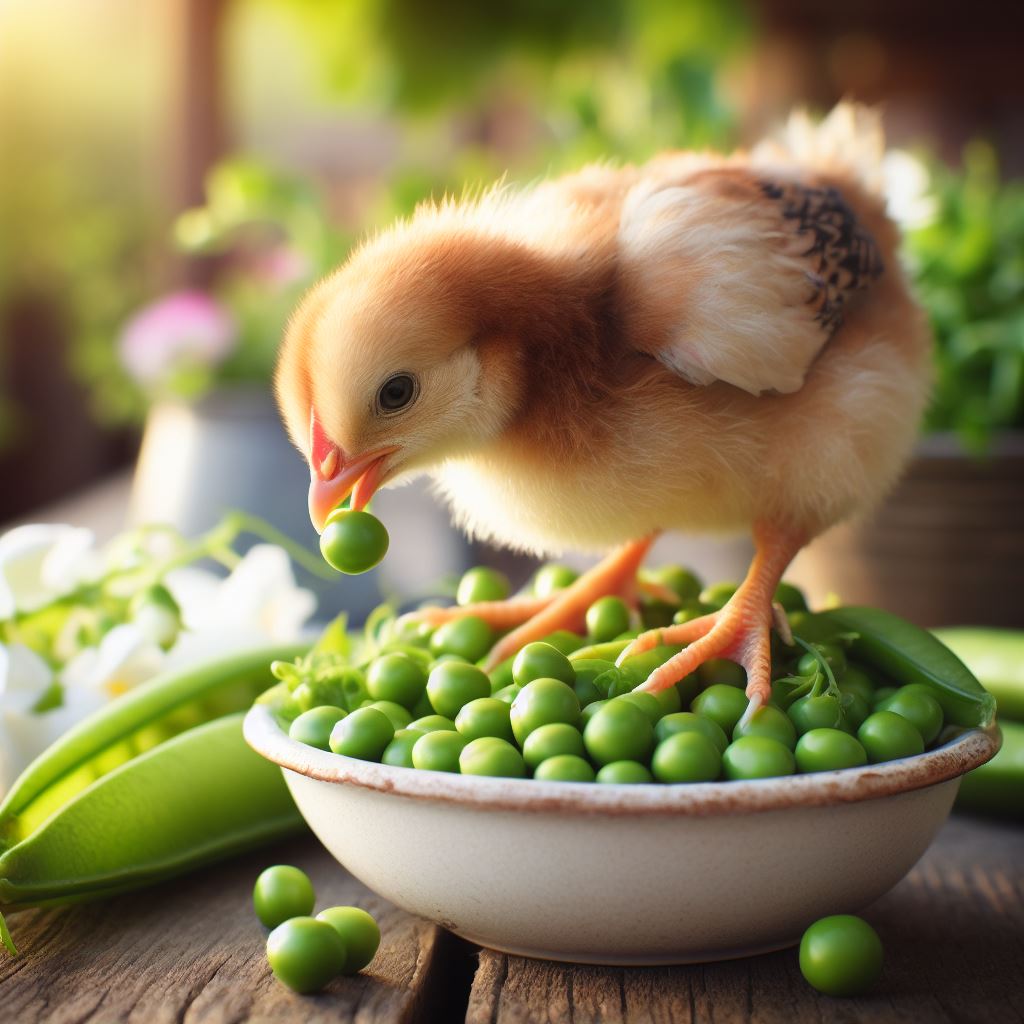
Table of content:
Yes, chickens can eat peas in moderation. Peas provide nutrients like protein, vitamins A and C, phosphorus, and antioxidants. Feed peas occasionally as treats to supplement a balanced diet.
This comprehensive guide will explore everything chicken owners need to know about feeding peas to their flock. Peas contain many vitamins, minerals, and nutrients that can benefit chicken health. T
hey are high in vitamin A, vitamin C, thiamine, folate, iron, magnesium, phosphorus, potassium, zinc, and protein.
When fed in moderation, peas can provide the following benefits:
- Promote gut health – Peas are a source of soluble fiber that supports healthy digestion. The prebiotics in peas may also encourage healthy gut bacteria.
- Boost immunity – The vitamin C, vitamin A, and antioxidant content of peas helps strengthen the immune system.
- Support bone strength – Phosphorus, zinc, and vitamin K in peas contributes to bone and eggshell strength.
- Aid feather growth – The protein, zinc, and vitamin A in peas contribute to plumage health.
- Provide energy – Peas offer complex carbohydrates for sustained energy.
However, peas should not make up a large portion of a chicken’s diet. Too many peas could lead to nutritional imbalances.
Can Chickens Eat All Types of Peas?
Chickens can eat most types of peas:
- Garden peas – Also called English peas or green peas. The whole pod can be fed.
- Snow peas – The flat edible pods are safe for chickens.
- Sugar snap peas – Another variety with edible pods.
- Split peas – Dried and split field peas. Soak before feeding.
- Pea shoots – The shoots and tendrils of pea plants.
Avoid feeding chickens pea pods that are wilted, moldy, or damaged. Also do not feed crowder peas, chickpeas, or other legumes.
Chickens should not eat raw kidney beans or raw lima beans, which contain toxins. Make sure to cook these bean varieties before feeding to chickens.
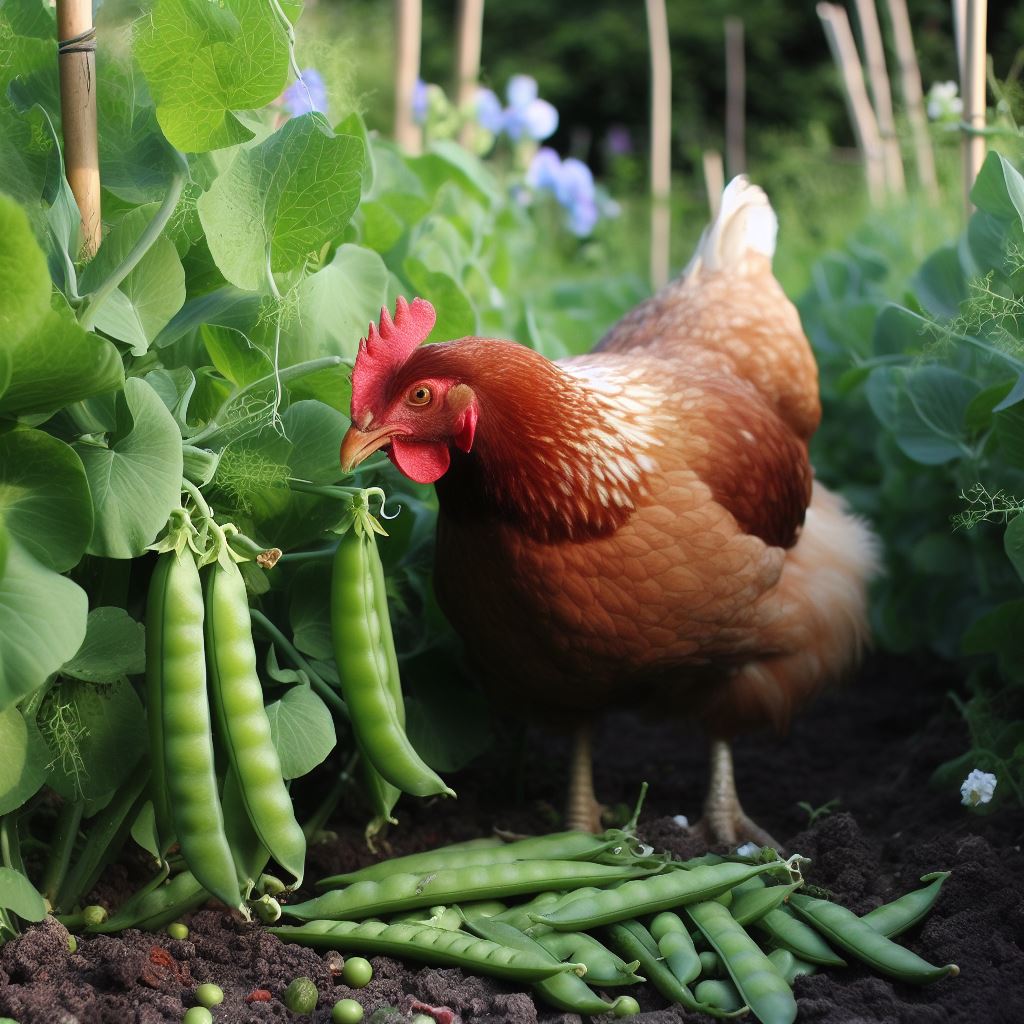 How to Feed Peas to Chickens
How to Feed Peas to Chickens
Follow these tips for safely incorporating peas into your flock’s diet:
Purchase High-Quality Peas
Look for fresh, organic peas whenever possible. Avoid peas that are old, wilted, moldy, or damaged. Do not feed decaying pea vines.
Feed Peas in Moderation
Peas should be an occasional treat rather than a daily vegetable. Overdoing peas could lead to weight gain or nutritional imbalances.
Peas account for 5-10% of a balanced chicken diet. For example, a 1/4 cup serving 1-2 times per week is a good amount for most chickens. Adjust quantities based on your chickens’ size and preferences.
Introduce Peas Slowly
When offering peas for the first time, only feed a small portion to each chicken. Observe your flock for signs of digestive upset, such as loose droppings. If any chickens have adverse reactions, remove peas and try again later.
Offer Both Peas and Pods
For garden peas and snow peas, chickens can eat both the peas and pods. This provides more nutritional variety.
Chop or Mash Peas for Chicks
Baby chicks may have difficulty swallowing whole peas. Chop or mash peas into bite-sized pieces for chicks.
Cook Dry Peas Before Feeding
Always cook dried peas before feeding them to chickens. Soak split peas overnight, then simmer until soft. Cooked peas are easier to digest.
Provide as Part of a Balanced Diet
Combine peas with other fruits, vegetables, grains, protein sources, and supplements to meet your chickens’ nutritional requirements.
Store Leftover Peas Properly
Cooked peas can be stored in the refrigerator for up to 5 days. To freeze, blanch peas first to stop the cooking process. Then store in airtight containers.
Watch for Signs of Illness
Monitor your flock’s droppings, energy levels, and appetite when introducing new treats. Discontinue peas if any chickens have adverse reactions.
Avoid Moldy or Rotting Peas
Never feed chickens moldy, rotting, or fermented peas, vines, or pods, as these can contain mycotoxins. Discard any peas that are past their prime.
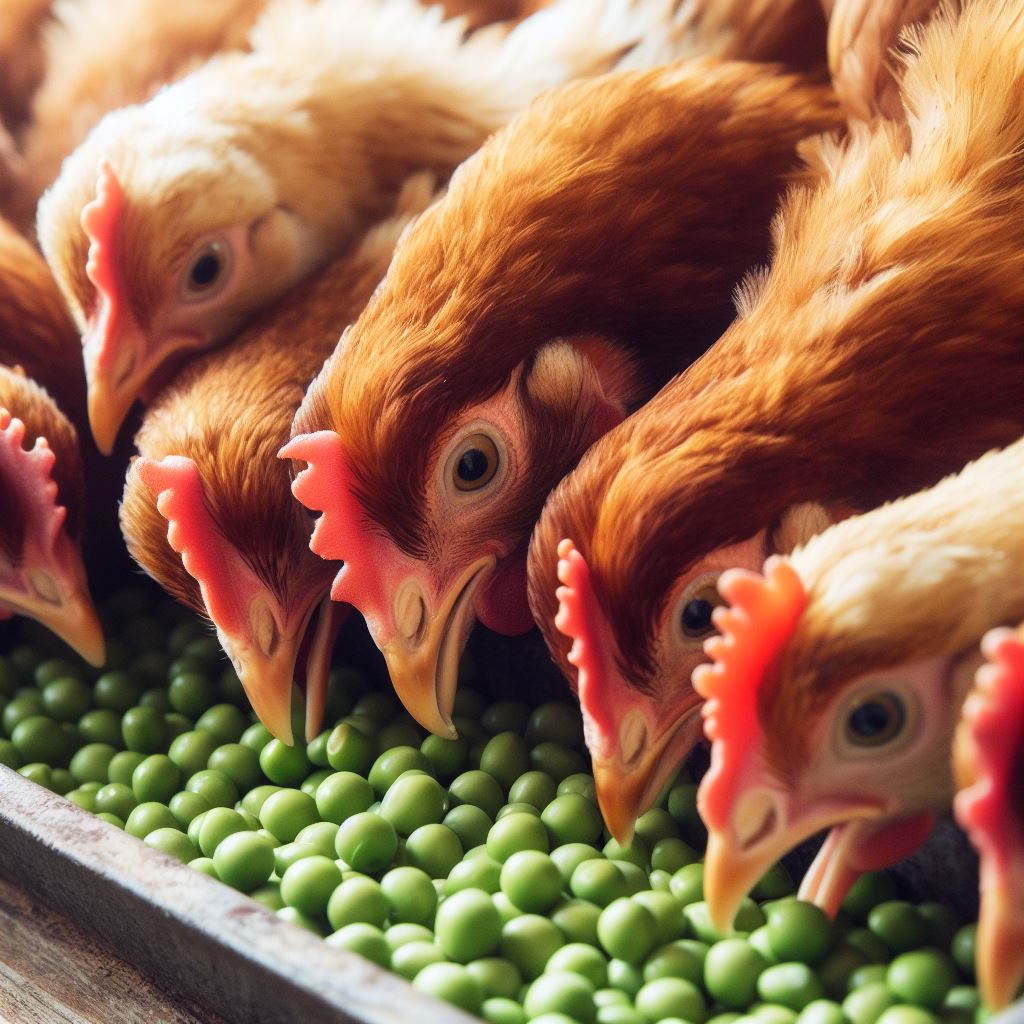 Health Benefits of Peas for Chickens
Health Benefits of Peas for Chickens
When fed properly, peas offer many important vitamins, minerals, and nutrients. Here is a breakdown of the major health benefits of peas for chickens:
Protein for Growth
Peas contain over 8 grams of protein per cooked cup. The protein in peas supports muscle growth, tissue repair, feather health, and egg production.
Vitamin A for Reproduction
Peas are rich in beta-carotene, providing over 30% of a chicken’s vitamin A needs per cup. Vitamin A is essential for reproduction, growth, eye health, and immunity.
Vitamin C for Immunity
With over 15 mg of vitamin C per cup, peas can help strengthen chickens’ immune systems and respiratory health. Vitamin C also supports collagen formation.
B Vitamins for Metabolism
Peas provide thiamine, riboflavin, niacin, pantothenic acid, pyridoxine, and folate. These B vitamins aid carbohydrate metabolism and energy production.
Iron for Blood Health
The iron in peas helps chickens produce hemoglobin, supporting the oxygen-carrying capacity of blood.
Phosphorus for Bone Strength
Peas contain phosphorus, an essential mineral for healthy bone development, growth, and eggshell strength.
Potassium for Nerve Function
The high potassium content of peas supports fluid balance, muscle function, and nerve transmission.
Magnesium for Enzyme Function
Peas provide magnesium – a mineral involved in over 300 enzyme reactions in the chicken’s body.
Antioxidants for Immunity
Peas contain antioxidants like alpha-carotene, beta-carotene, and lutein. These compounds reduce inflammation and encourage immune response.
Potential Concerns When Feeding Peas
While peas make a nutritious treat, they do come with some precautions:
Weight Gain
Too many peas could lead to obesity, as peas are relatively high in carbohydrates. Limit peas to occasional treats.
Nutritional Imbalances
Peas should not overwhelm the diet. An excess could create deficiencies in other nutrients.
Allergic Reactions
Rarely, chickens may be allergic or sensitive to peas. Discontinue use if any signs of allergy occur.
Contaminants
Spoiled, moldy, or contaminated peas could cause illness. Thoroughly inspect peas and discard any that are past prime.
Intestinal Upset
Overfeeding peas could disrupt digestion, causing loose droppings, gas, or diarrhea. Start with small amounts.
Raw Bean Toxins
Never feed chickens raw kidney beans or lima beans, which contain toxins. Always cook these bean varieties before feeding.
How Many Peas Can Chickens Eat?
The amount of peas chickens can eat depends on the size and age of your flock. Follow these pea feeding guidelines:
Chicks Under 4 Weeks
Chicks should not eat whole peas, as they present a choking risk. Instead, finely chop or mash a few teaspoons of peas 2-3 times per week.
Pullets 4-18 Weeks
Up to 2 tablespoons of peas 2-3 times per week is appropriate for growing pullets. Mix peas into a balanced feed ration.
Mature Hens
Mature hens can eat up to 1/4 cup cooked peas 1-2 times per week. Adjust amounts based on your hen’s body weight and activity level.
Roosters
Roosters can eat a similar pea portion size as mature hens, relative to their size and weight.
Meat Chickens
Pastured meat chickens may graze on fresh pea vines. Supplement with 1-2 tablespoons of peas daily for variety.
Senior Chickens
Older chickens often appreciate softer peas that are easier to digest. Mash or chop peas into bite-sized portions.
When in doubt, offer smaller portions of peas and monitor your flock. Increase the amount gradually if the peas are well-tolerated.
How to Serve Peas to Chickens
There are many ways to incorporate peas into your flock’s diet:
- Top feed with fresh peas, mashed peas, or thawed frozen peas
- Mix dried peas into scratch grains or chicken feed
- Allow free-range chickens to forage on pea vines and pods
- Add peas to homemade feed mixes and mashes
- Scatter pea shoots, sprouts, and tendrils in a garden or yard
- Create chopped pea salads with corn, oats, or greens
- Hide whole peas in edible treats or scatter for foraging
- Offer pea sprouts in hanging treat balls or egg cartons
- Ferment peas with whey for natural probiotics
For young chicks, serve softened mashed peas on a chick feeding tray. Avoid forcing chicks to compete for peas, as weaker chicks may get pushed away.
Can Chickens Eat Peas Everyday?
Peas can be fed daily but are best served a few times a week. Too many peas may lead to:
- Excess carbohydrate intake
- Weight gain
- Nutritional deficiencies
- Digestive upsetRotate peas with other fruits and vegetables like carrots, berries, squash, and melons for variety. One good approach is offering peas 1-2 times per week.
Making Peas Safe for Chickens
When preparing peas for chickens, keep these safety tips in mind:
- Inspect peas and remove any damaged, slimy, or moldy pods
- Discard decaying pea vines or rotting peas
- Wash snow peas, sugar snaps, shoots, and pea pods before serving
- Cook any raw kidney beans, lima beans, dried peas before feeding
- Never feed chickens raw kidney beans or lima beans
- Monitor for signs of allergic reaction when introducing peas
- Store cooked peas properly in the refrigerator or freezer
- Gradually transition chickens to peas and other new foods
Being mindful of safety practices will help your chickens enjoy peas without issue. Monitor portions and your flock’s droppings for any signs of indigestion.
Common Questions about Chickens and Peas
Here are answers to some frequently asked questions about feeding peas to chickens:
Are peas good for baby chicks?
Yes, but the peas need to be chopped or mashed. Whole peas present a choking risk to chicks under 4 weeks old.
Can chickens eat pea shells?
Yes. Chickens can eat all parts of the pea plant, including the shells, pods, vines, and tendrils. This provides more nutritional variety.
Do peas give chickens gas?
Overdoing peas may cause loose droppings, gas, or diarrhea. Introduce peas slowly and feed in moderation until chickens adjust. Limit peas to occasional treats.
Can peas go bad for chickens?
Yes. Discard peas that are moldy, rotting, fermented, or contaminated, as these can make chickens sick. Only feed fresh, high-quality peas in portion-controlled amounts.
Are peas high in protein for chickens?
Peas contain over 8 grams of protein per cooked cup, making them a decent source of protein for chickens. However, peas are lower in protein than many insects, fish, and meat that chickens eat. Relying solely on peas for protein is not advised.
Should you cook fresh peas for chickens?
It is fine to feed chickens fresh, raw garden peas and edible pea pods straight from the garden. There is no need to cook fresh peas. However, dried peas should always be cooked before feeding to aid digestibility.
Conclusion
Peas are a nutritious, protein-packed treat that most backyard chickens will relish. When fed properly, peas provide many vitamins, minerals, antioxidants, and other nutrients that support chicken health and productivity.
Introduce peas slowly, in moderation, and as part of a balanced diet. Monitor your flock for any signs of digestive upset. With a little care and common sense, peas can be a great addition to your chickens’ feeds.
Welcome. I’m Adreena Shanum, the proud owner of this website, and I am incredibly passionate about animals, especially poultry. I founded adreenapets.com as a labor of love, stemming from my desire to share my knowledge and experiences with poultry enthusiasts worldwide.


